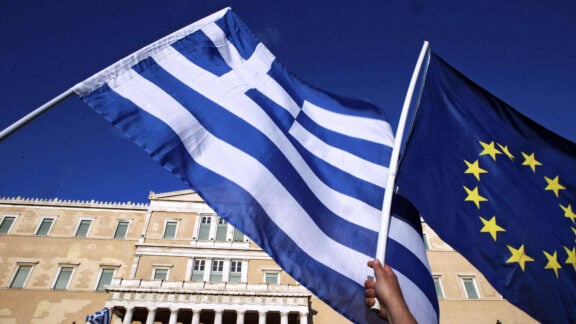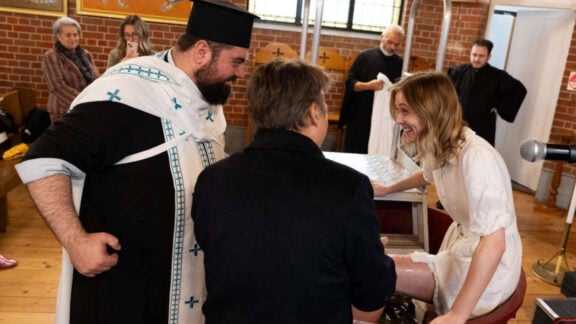On Tuesday July 12, the ABC reported on Winston, the five-year-old Bendigo boy who needs open-heart surgery but has had his operation cancelled “eight times”.
Cristean Tilkeridis, Winston’s father, is “emotionally overwhelmed”.
“I am completely overwhelmed, and it’s nine postponed operations, not eight, as reported on the ABC,” said Mr Tilkeridis to Neos Kosmos.
He said Winston has a “palliative” congenital heart disease, tricuspid atresia, and was due for his fifth open-heart surgery at the Royal Children’s Hospital (RCH) in April.
Mr Tilkeridis told Neos Kosmos that his family “had an email from the hospital which said the operation is scheduled for late July”.
“We will be hearing from the hospital over the next couple of days, I think they want to ensure that it is a watertight deadline before they come back to us.”
Winston’s surgery has been classified as category two, as “semi-urgent”, with surgery required within 90 days.
“And if he wasn’t to get into surgery, he’d eventually have heart failure — and then it would be emergency surgery,” Mr Tilkeridis told the ABC.
A spokesperson from the Royal Children’s Hospital confirmed that an “increase in demand” along with “high acuity in our patients and increasing levels of staff illness,” has impacted on wait times for services “as well as some planned surgeries.”
“We assess our ability to perform planned surgeries each day depending on the clinical priority of any emergency patients who have presented overnight, bed availability and staffing levels,” the RCH spokesperson wrote to Neos Kosmos.
The RCH said that that they will “continue to work closely with families to reschedule postponed procedures as soon as is possible”.
Mr Tilkeridis contacted the Victorian Department of Health, who were in touch in June, but he has not heard from them since.
Neos Kosmos sought comment from Mary-Anne Thomas – Victoria’s new Minister for Health – but at the time of completing this report had not received anything.
Dr Roderick McRae, the president of the Victorian branch of the Australian Medical Association (AMA), told Neos Kosmos that the hospital is facing extreme pressure.
In the case of Winston, Dr McRae said that there are only two places where such a complex surgery could be carried out, and one of them is the RCH. He said that these operations require time in the intensive care unit [ICU] after the operation.
“If you or I had open heart surgery we would need to go into an intensive care unit after the operation, and if you know there is no intensive care unit available, then you don’t start the operation,” Dr McRae said.
Dr McRae also expressed deep sympathy with Winston and his family.
“Those trying to look after people like Winston are reduced to tears when they can’t provide the level of care they could on a good day,”Dr McRae told Neos Kosmos.
Our hospital crisis
Mr Tilkeridis said the surgeon at the RCH apologised for cancelling Winston’s operation and said it was a “resourcing” issue.
However, like many Victorians, the Greek Australian father from Bendigo, cannot understand “why after two years” of COVID-19 the hospital system is again being overwhelmed.
“I do not understand why we are in such a situation; the government has had over two years to deal with this situation,” a frustrated Mr Tilkeridis told Neos Kosmos.
COVID-19 illness and banked up surgeries have overwhelmed hospitals, and many have had operations cancelled numerous times.
Dr McRae told Neos Kosmos that there has been historic “under investment in capacity across Victoria, and Australia, forever”.
“We’ve had an increasing population but no matching increase in hospital beds, in mental health services, and everything else,” Dr McRae said.
Mr Tilkeridis said that the only thing he can see “is that the Victorian government has said that public hospitals and ambulance services will receive a $3000 payment to alleviate some of the pressure”.
Dr McRae said that the $3000 was needed as “a retention bonus” to all hospital staff.
“The head of cardiac surgery gets it, as does the cleaner and the person on the door, the bonus is there to encourage people not to abandon a system that is intensely stressed.”
Dr McRae said that almost 2000 healthcare workers are furloughed from the public hospital system.
“Health workers are either sick themselves, or they’re looking after a sick relative, partner, or child,” Dr McRae told Neos Kosmos.
COVID burnout by health care workers, including doctors and hospital staff is another issue.
“We were under the pump already then COVID hit, and many healthcare workers who carried the burden said, ‘I don’t need this’, and retired, they left the system; if you are 55 and you think ‘well if I keep going like this, I’ll catch COVID,” you just leave.

Can foreign doctors fill the gaps?
Neos Kosmos asked Dr McRae if the AMA is in favour of increasing the number of foreign doctors coming in.
He said it was a “difficult balance” and foreign medical graduates are also needed in the nations their own nations.
“It is also a moral question,” said Dr McRae, and then asked, “Is it ethical to take a doctor out of the Philippines and put them in Australia?”
Dr McRae said that the Australian Medical Council (AMC) “wants to recognise doctors, but some of them may not be relevant to the Australian circumstance.”
“A great doctor from Africa may be excellent at issues such as malnutrition and malaria, and other diseases specific to that region. But they need to come up to speed here and cannot suddenly be looking after a 5-year-old with tricuspid atresia, that all takes time.”
Community complacency to COVID is a cause of the crisis
Dr McRae was shocked that “30 percent of Australians have not had their boosters”.
“Community complacency” such as people not wearing masks on public transport, and “people not getting boosters” are a cause for the immediate crisis in the health care system.
Professor Vasso Apostolopoulos the world-leading virologist from Victoria University said that “the pandemic has not become endemic”.
The COVID-19 pandemic “is not over”, and only vaccinations, boosters and where necessary mask wearing can make us safer.
“New waves of Omicron variants BA.4 and BA.5 have dramatically increased the rate of illness, hospitalisation, and death in unvaccinated people, and those who have not had their boosters,” said Prof Apostolopoulos.
Dr McRae said that “vaccination is terribly important, and I’ve seen as a lot of elderly Greek people that haven’t been vaccinated who get very ill, and too often, die.”
“Vaccines protect people, they will stop you going into hospital and stop you blocking up the health system,” Dr McRae said.
The flu and other viruses that had been absent during lockdowns have added to the havoc, the doctor added.
“If you can’t see your GP for five days because they are booked out, and you have a sick child then you will present to emergency in a hospital and that all adds to the stress.”
The whole family suffers from the health crisis.
The Bendigo based Greek Australian, Mr Tilkeridis said that his whole family is feeling the stress, affecting their mental health. A historically underfunded health care system, waves of new Omicron variants and COVID complacency are taking a toll on Winston and his family; their lives at a “standstill” until he gets surgery.
“I’ve had to return to work because I don’t have enough leave. I was planning my leave around this operation for a good two years,” Mr Tilkeridis told the ABC.
Winston and his twin brother Harvey also cannot start kindergarten, because they have been told Winston cannot get vaccinated until he has the surgery.
The family, including Winston’s grandparents, have had to stay in self-imposed isolation since May to ensure Winston does not get COVID prior to his operation.
The Victorian government seems unwilling to risk political capital as they head to a state election. After two years of lockdowns and harsh controls, there is little craving for mask and vaccine mandates. Add to that a federal budget cut to the bone after 24 months of hard expenditure due to a pandemic and you have the perfect storm.









